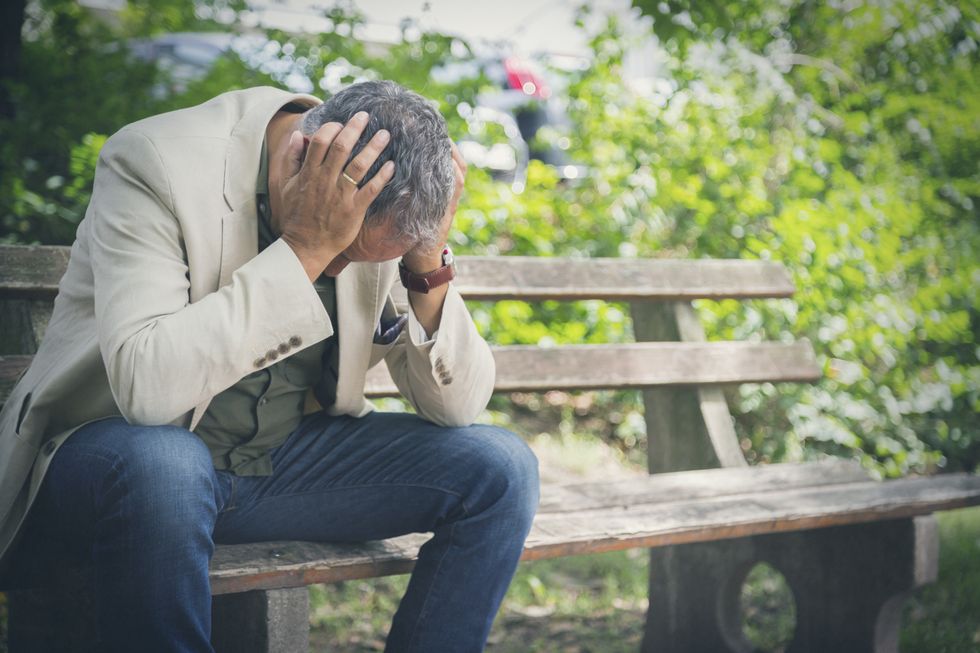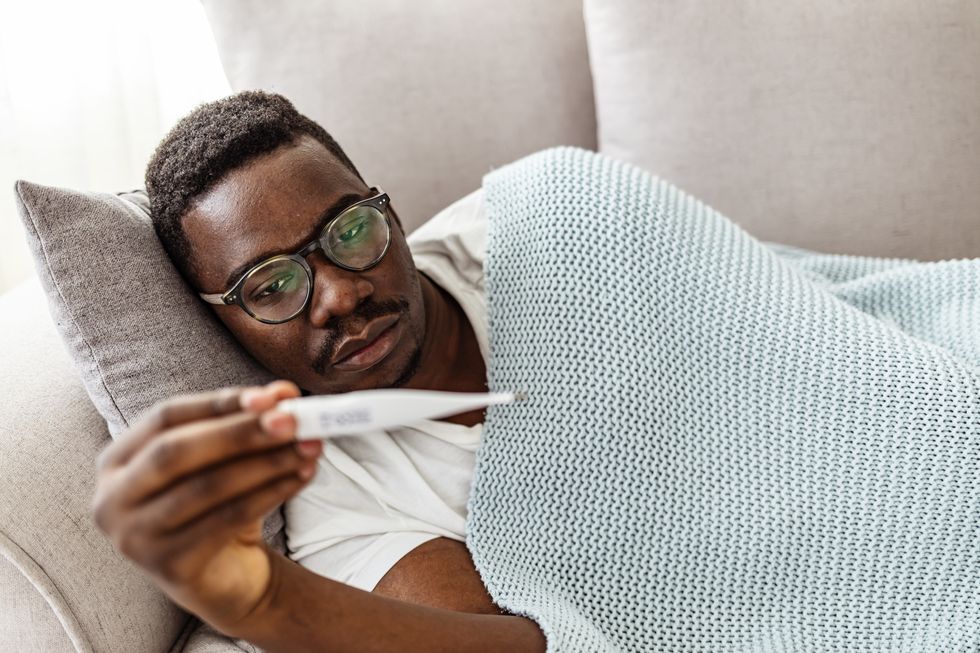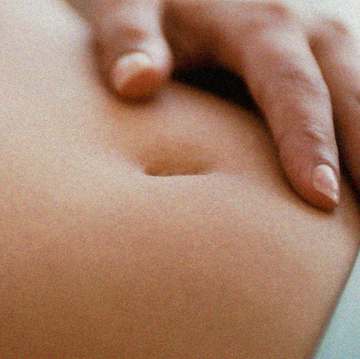Let's face it, we're all a little guilty of dismissing men's ailments. Got the snuffles? Man flu. Tired? Of course he is. So when Robbie Williams, who speaks candidly about his mental health in a new Netflix documentary, said he was suffering from the 'manopause', we initially took his complaints with a pinch of salt.
The singer, 49, complained of thinning hair and lethargy, also blaming his symptoms on his famously hard-partying lifestyle from his younger years. But is this so-called menopause really a legit thing? Or is it just man flu mark two?
To unpack such a stigma-attached issue that light is seldom shed on, we spoke to Dr Jeff Foster, a GP who has a special interest in mental health. From what exactly is the 'manopause', to how we can raise awareness of it, he emphasised the importance of it being recognised as a genuine issue.
What is the 'manopause'?
According to Foster and the NHS, the 'male menopause' or 'manopause' is a term coined by the media, in an effort to compare the drop in energy, increase in mood swings, muscle loss and other symptoms that men in their 40s and 50s may experience (so around a similar age to women going through the menopause).
While the NHS says there's a small chance these symptoms could be caused by a drop in hormones (similar to the drop in oestrogen that happens to women when they're menopausal), this isn't a super common issue – unlike the menopause, which impacts near enough every woman.
Essentially, in rare cases, the manopause could be the result of "testosterone deficiency and a drop in the main male sex hormone," says Foster, which is simply (and typically) a result of getting older. However, for other men it could be down to lifestyle changes (like reaching the midlife point and reflecting back on how far they've come, work stress, or family life).
Symptoms may vary in terms of how mild or extreme they are – but we'll get to that in a sec.
How is it caused?
Unlike menopause, Foster and the NHS note that there are lots of varying causes. However, the aforementioned "age-related decline" is the most common.
"From the age of 30, men decrease their testosterone production by about 1% a year and that's normal," says Foster, who adds that those with a little less testosterone during the 30th-year peak will most likely start noticing symptoms "at a much earlier age."
Alongside age, Foster shares that there are a few more causes of the testosterone drop. Lifestyle-wise, he notes that "being overweight is a massive trigger in the UK." Plus, mild medical problems, including high blood pressure, asthma, and sleep apnea can all be responsible. Other, more serious catalysts can include thyroid disease and alcohol abuse.
What are the symptoms?
Perhaps the reason why a testosterone drop has been coined as 'manopause' is because some of the major symptoms are extremely comparable to menopause, says Foster.
In terms of the physical symptoms, some "men find that they start to become more tired and have less energy and motivation."
Foster explains as such: "You may find that you make the same effort in the gym, but you just can't put on the same muscle." Or, "your body size starts to change and you start to put on fat when you used to have muscle instead." Equally, the NHS adds, this can also happen simply due to ageing, as opposed to a hormonal issue.
From a mental health perspective, Foster notes that people can get "more grumpy" and "more irritable." And from his experience, details that some people say they "lose their lust for life", lose job motivation and generally "become less happy."
When looking at symptoms from a sexual side, Foster says that men may "find a drop in libido, which is distinct from erectile dysfunction." He does go on to detail that the 'manopause' can cause erectile dysfunction, but more commonly, "it's just a lack of interest and a 'I'm not so bothered about sex as I used to be'" kind of thing.
As it gets more severe, he explains this is when 'manopause' symptoms start to mirror more classic menopause symptoms. This may include things like night sweats, flushes, osteoporosis, and even heart problems – all of which are important to get checked out by a medical professional.
Is it comparable with the menopause?
"The big problem we have for men," Foster says, is that "unlike 'manopause,' the menopause is expected."
"Every woman is going to experience menopause, and so for that reason, when these [hormone deficiency-related] symptoms start to come through for men, they are culturally and sociologically designed to think this is normal for a guy in their forties and fifties."
However, the NHS does also state that "lifestyle factors or psychological problems" are likely responsible for many of 'male menopause' symptoms, too. Which is why it would be rash to directly compare the 'manopause' with the menopause.
The website details that mood swings, erectile dysfunction, and low sex drive could also stem from stress, depression and anxiety. Not to mention physical causes of erectile dysfunction, like heart problems or smoking "which may happen alongside any psychological cause."
In terms of the latter, the NHS outlines physiological problems are "typically brought on by work or relationship issues, money problems or worrying about ageing parents." It also places responsibility on a "midlife crisis," which can occur when men think they've "reached life's halfway stage."
This is labelled as anxiety over their accomplishments, whether it be professionally or personally, which can then lead to a period of depression. The NHS' other 'manopause' causes include poor diet, lack of sleep, lack of exercise, too much alcohol, and low self-esteem.
At the end of the day, whether your symptoms are hormonal or not, it's always important to see your GP to get a clearer picture of how to manage them.
Is the 'manopause' serious?
"The 'manopause' is potentially serious and that's the whole issue," states Foster. While typically, men don't have as severe symptoms as women, he argues that because of the lack of knowledge and information surrounding the drop in hormones that men also experience with age, it can be a "much more insidious, slow decline over many years."
Another point worthy of mention? "Even if it's not serious in terms of something like an osteoporosis risk, because most men probably won't get that," Foster says that in men with testosterone deficiency, their "quality of life is impaired."
"For that reason, it becomes a burden on the NHS and it becomes a burden on [sufferers'] work because they're not functioning as they used to be," he stresses. "We have a large number of patients who have been diagnosed with depression, chronic fatigue syndrome, or non-specific joint pain and tiredness, and they receive antidepressants or painkillers when it was hormonal the whole time."
Are there any treatments for 'manopause?'
Foster says that there is a misconception that you can 'lifestyle your way out' of low testosterone. Unless you have all the classic markers of a terribly poor lifestyle - we're talking smoking, obesity, drinking excessive amounts of alcohol, no exercise, and not getting enough sleep - he outlines that, for most people, "you can't lifestyle it out and you have to medicate it."
According to the NHS, your GP will first order a blood test to measure your testosterone levels. If the results suggest a testosterone deficiency is causing the symptoms, you'll likely be referred to an endocrinologist - a hormone specialist.
Following confirmation from the specialist, you may be offered testosterone replacement to relieve your symptoms. You won't get a super huge dose of the stuff, Foster says, just enough to "put you back to where you were." Or "where you should have been for your age or maybe slightly better."
The treatment is given in either topical gels, creams, or an injectable form, which he says you can do either once every week or once every nine weeks - it's up to you. But whichever you choose it is likely to be "extremely successful."
How can we raise awareness of the 'manopause'?
According to Foster, there are nearly a million people in the UK already diagnosed with 'manopause.' A 2023 study from University City London reveals that there are currently around 13 million perimenopausal or menopausal women in the UK, which equates to one-third of the female population.
While both numbers are high in their own right, Foster notes that the public knowledge and conversation around 'manopause' is next to nothing compared to menopause.
"If you think about menopause, we've had the Davina phenomenon over the last five years, plus people like Dr Louise Newson who are giant menopause advocates." He notes that both women have "thrust the concept of menopause into the forefront," therefore providing the important conversation with a huge platform. However, in terms of testosterone, he says it's something that's never had its moment, be it in the media or at med school.
"The best way you can get people aware of conditions is through public awareness," he says. And if there's social pressure and enough people who actually go to the doctors seeking 'manopause' treatment, it will "change how the NHS is driven."
More worryingly, he reveals that stigma sees patients who have an onset of symptoms wait three years on average until they finally see a doctor – adding that their quality of life could be declining the entire time. Foster also notes that the "risk of other medical conditions" can increase, too.
So there you have it. The 'manopause' isn't just another fad. It's a genuine and "potentially serious" testosterone deficiency issue, or drop in mood due to lifestyle issues, that deserves a whole lot more airtime than it currently gets.
Hopefully, thanks to Robbie Williams' brave and open discussion about his experiences, we can shift the 'manopause' stigma so people can actually get the help they need – whatever the cause.
This article is not intended to be a substitute for professional medical advice or diagnosis. Always seek the advice of your physician or other qualified health provider with any questions you may have regarding a medical condition.















